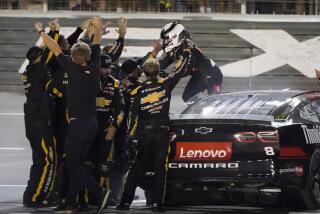A new Roddick is on display at U.S. Open
- Share via
A new, improved Andy Roddick was on display Thursday night at the U.S. Open. He is a product worth looking at these days, maybe even buying into.
Yes, the old Roddick had streaks of inconsistency, of adolescent underachieving. His game has always been huge, but so has his downside. In years past, there have been blowups at chair umpires, blowups at himself, blowups merely for the sake of blowing up.
But the version on display, in front of a full house of 23,763 in the monstrous tennis stadium that annually lines the coffers of the U.S. Tennis Assn., was nearly without flaw in a 6-1, 6-4, 6-4 victory over a Frenchman named Marc Gicquel.
Yes, Roddick is seeded fifth and Gicquel, at No. 81, is one of a legion of guys just trying to stay in the top 100. But on the ATP Tour, No. 81 can be dangerous unless he is quickly shown his place.
Roddick did that in the first game.
He got the first point after a long baseline rally, one of those who-is-going-to-lose-focus-and-crack-first points. Then he aced Gicquel with a wide kick serve, only 106 miles an hour, and followed that with a 128 service winner.
It used to be Andy Roddick, man of power. Now it is Andy Roddick, man of power and patience.
That’s especially interesting, and significant, since he has always played like a guy trying to catch a bus. He is still a bundle of fidgets and tugs at his shirt. Several times, on breaks between games, Roddick was up and pacing behind the baseline while Gicquel was still in his chair, waiting for the chair umpire to call “time.”
The difference is now, once the ball was in play, there was a calm that seemed to come over Roddick, as he tried the angles, moved Gicquel from side to side and waited for an opening, rather than forcing one or rushing one, a la the old Andy Roddick. Gicquel is the type of player who lives at the baseline, and Roddick made his life miserable there.
Roddick was both realistic about what he did Thursday night, it being a second-round match against a low-ranked guy with few weapons, and pleased.
“I’m hitting it well,” he said afterward. “I had good ball control, and I knew when it was right to go for one and when it was right to lay off.”
He also knows that things will get tougher from now on, starting with a third-round match against young U.S. player John Isner, who is 6-feet-9 and serves like it.
“I was tall when I came on the tour,” Roddick joked, noting his many matches this summer with the likes of Isner and 6-6 Sam Querrey. Now I’m five inches shorter.”
Roddick is also in arguably the toughest side of the draw. His quarterfinal match projects out to be No. 4 Novak Djokovic and, getting past that, a semifinal with Roger Federer.
Federer, of course, is the one player Roddick may see most often in his nightmares. His Wimbledon final loss to Federer in July, an incredible 5-7, 7-6 (6), 7-6 (5), 3-6, 16-14 classic, left him drained and devastated, as it would any player. In that match, his serve wasn’t broken until the 77th, and last, game of the match.
But the aftermath has been, in many ways, positive and even encouraging. He handled the on-court ceremony with grace, and the post-match news conference the same way. Not always a gracious loser, or one that could hold back an ill-timed smart-aleck remark, Roddick was the textbook good loser.
“It certainly wasn’t something that I expected as far as the reaction and whatnot,” he said. “But it certainly has helped as far as kind of getting -- as far as moving on and wanting to get back on the court.
“I’m appreciative of the support, and I’m enjoying it. Hopefully, I’ll be able to use that here.”
In many ways, this is Roddick’s place. He won the U.S. Open, his only grand slam title, in 2003. And he feeds off the raucous and supportive night crowds.
“People here have energy,” he said, “and players feel that and feed off of it.”
Roddick was so good that Gicquel didn’t get a break point until the last game of the match. But Roddick, going to his power side, hit an ace back to deuce and then enticed two errors from Gicquel to close out the match.
Gicquel was the second oldest man in the men’s draw, a year younger than Nicolas Lapentti. Roddick is no spring chicken at 27. But there seems to be a maturity now that may come with that age.
“We [tennis players] kind of live in a world of denial,” he said. “I think the fact that you have to realize what may have been most effective five, six, seven years ago maybe isn’t the most effective now.”
The highlight of watching Gicquel was his tendency to end a long run for a ball in a huge split, similar to Kim Clijsters. He did that three times, they showed it on the big screen three times and the crowd groaned in sympathetic pain all three times.
The old Roddick would have wisecracked something one of those times. The new one just kept his head down, shut his mouth and won both impressively and efficiently.
--
More to Read
Go beyond the scoreboard
Get the latest on L.A.'s teams in the daily Sports Report newsletter.
You may occasionally receive promotional content from the Los Angeles Times.











